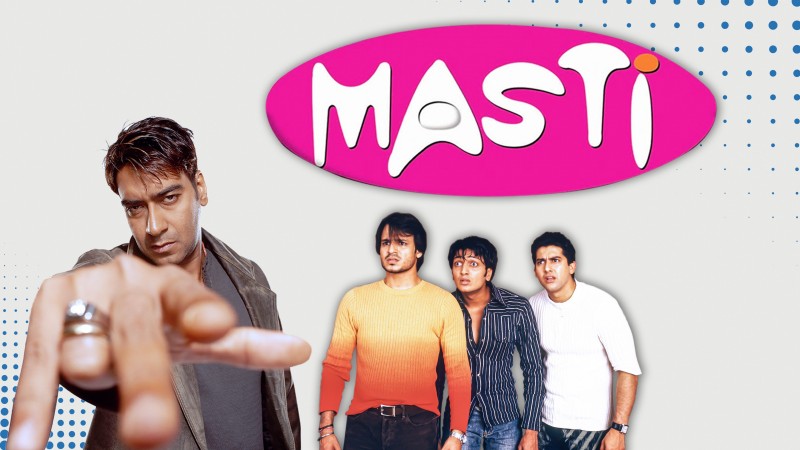
A film's journey from idea to completion is frequently an intricate and captivating one. This is also true of the 2004 Bollywood comedy "Masti," which was helmed by Indra Kumar. "Masti" is distinct due to its remarkable journey, which includes a title change, legal disputes over the rights to that title, and its eventual success at the box office. When director Raj N. Sippy claimed the rights to the original title "Khujli," intending to make a film called "Khujli" in 1985, the development of the film encountered a major obstacle. This piece will delve into the fascinating story of "Masti" and how it went from being a "Khujli" to a popular comedy.
Filmmaker Raj N. Sippy had the concept for the movie "Khujli" in the middle of the 1980s. The word "Khujli" is a Hindi word that means "itch," and its original meaning was probably to be a whimsical and humorous interpretation of the theme of temptation and desire. However, the film was never made in the 1980s for reasons that are still mostly a mystery.
Indra Kumar, a filmmaker, was developing a comedy script in the early 2000s that revolved around the lives of three married men who are looking for thrills and a way out of their boring daily routines. Considering how closely "Khujli" relates to the film's theme, Indra Kumar thought it was the ideal title for this comedy. The project was taking shape as a compelling comedy for adults, and "Khujli" seemed like the perfect title to capture the spirit of the narrative.
Indra Kumar was unaware that Raj N. Sippy still held the rights to the name "Khujli." Once production on Kumar's project, which was initially going to be called "Khujli," got underway, Raj N. Sippy filed a legal challenge. He claimed to be the rightful owner of the title and mentioned that he had planned to produce a movie called "Khujli" in 1985.
Since "Khujli" had come to be closely associated with the project, this legal dispute added another level of complexity to the film's development. It was essential to the identity and commercial potential of the movie. A difficult choice had to be made by Indra Kumar and his group in light of the legal challenge: either contend for the title or come up with a substitute that would convey the essence of the movie just as well.
Considering the legal entanglements associated with the term "Khujli," Indra Kumar and his group decided to take a different approach. They chose to rename the movie "Masti," which translates to "fun" or "merriment" in Hindi. This title change signified more than just a simple substitution; it also represented a change in the tone and message of the movie. The name "Masti" aptly captured the essence of the movie, showcasing the playful, comical, and daring elements of the narrative.
The movie, now called "Masti," followed the tale of three friends—Riteish Deshmukh, Aftab Shivdasani, and Vivek Oberoi—who choose to leave their married lives behind and go on an extramarital adventure. As they make their way through a string of humorous mishaps and unexpected consequences, humour follows. Along with being a hilarious comedy, the movie also took a satirical look at male fantasies and the difficulties of marriage.
"Masti" was a huge box office hit, even after the initial setback brought on by the dispute over the title. Because it combined humour, entertainment, and a realistic plot, the movie was well-received by viewers, especially young adults. The film's success was largely due to the lead actors' outstanding performances, the clever dialogue, and the situational humour.
The Bollywood adult comedy "Masti" revolutionised the genre. It proved that when handled tastefully, Indian audiences were receptive to sophisticated humour. The comedy director Indra Kumar and several actors got their start in the comedy genre thanks to the film's success, which also opened the door for a wave of other comedies of a similar nature.
The development of the movie "Masti" from its original idea as "Khujli" to its eventual success as a comedy is a tribute to the adaptability and tenacity of Bollywood directors. A new, more appropriate title and a novel marketing strategy for the movie were eventually introduced as a result of the legal dispute over the title, which could have been a major obstacle.
The film "Masti" demonstrated that a movie's success depends not only on its title but also on its execution, content, and audience response. In the ever-changing realm of Indian cinema, the film's journey also emphasised the value of creativity and adaptability.
"Masti" became a landmark in the annals of Indian comedy films, demonstrating that occasionally, a little "masti" is all that's needed to transform a difficult circumstance into an extraordinary triumph.
The Making of 'Ek Se Bure Do': A Journey Filled with Twists and Turns
Krazzy 4 Song Controversy: Ram Sampat's Plagiarism Allegations Against Rajesh Roshan